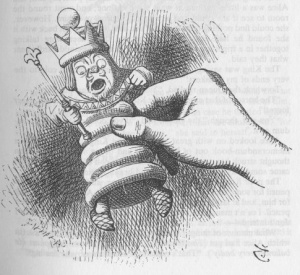Kartographie des Freiheitsbegriffs (FiK)
Determiniert, oder ein Leben hinter dem Spiegel
Wenn man den Vertretern eines strengen Determinismus glauben schenkt, sind es nicht wir die handeln, sondern es handelt in uns. Daher ist das Gefühl der Willensfreiheit, ein solches wird meistens doch zugestanden, eine Chimäre und was wir als freie Willensentscheidung betrachten, ist bloß eine Illusion. Demnach wären wir Spielfiguren in einem für uns nicht erkennbaren Spiel. Gezogen von Naturgesetzen, die im 20. Jahrhundert an Stelle eines lenkenden Gottes, getreten sind, jedoch mit vergleichbaren Attributen. Lewis Carroll setzt in folgender Szene, aus seinem
Buch "Trough the Looking Glass. And What Alice found there", Alice als diese allumfassende und allmächtige Entität. Die "aufgeklärten" Spielfiguren geben erstaunlich naturwissenschaftlich plausible Antworten auf "unerklärliche" Ergeignisse.
Zur Handlung: Alice ist durch den Spiegel in den Raum dahinter gestiegen und sieht sich mit lebenden Schachfiguren konfrontiert. Auf einem Tisch schreit Lily, die Tochter der Weißen Königin, und Alice versucht zu helfen. Wie sich im Verlauf der Szene herausstellt, ist Alice unsichtbar, überdimensional gross und damit "allmächtig", allerdings ist sie für die Spielfiguren nicht wahrnehmbar. Attribute, die man gewöhnlich Gott zuspricht und den Naturgesetzten. Hier die Originalstelle:
"Alice was very anxious to be of use, and, as the poor little Lily was nearly screaming herself into a fit, she hastily picked up the Queen and set her on the table by the side of her noisy little daughter.
The Queen gasped, and sat down: the rapid journey through the air had quite taken away her breath and for a minute or two she could do nothing but hug the little Lily in silence. As soon as she had recovered her breath a little, she called out to the White King, who was sitting sulkily among the ashes, 'Mind the volcano!'
'What volcano?' said the King, looking up anxiously into the fire, as if he thought that was the most likely place to find one.
'Blew--me--up,' panted the Queen, who was still a little out of breath. 'Mind you come up--the regular way--don't get blown up!'
Alice watched the White King as he slowly struggled up from bar to bar, till at last she said, 'Why, you'll be hours and hours getting to the table, at that rate. I'd far better help you, hadn't I?' But the King took no notice of the question: it was quite clear that he could neither hear her nor see her.
So Alice picked him up very gently, and lifted him across more slowly than she had lifted the Queen, that she mightn't take his breath away: but, before she put him on the table, she thought she might as well dust him a little, he was so covered with ashes.
The King was saying, 'I assure, you my dear, I turned cold to the very ends of my whiskers!'
To which the Queen replied, 'You haven't got any whiskers.'
'The horror of that moment,' the King went on, 'I shall never, NEVER forget!'
'You will, though,' the Queen said, 'if you don't make a memorandum of it.'
Alice looked on with great interest as the King took an enormous memorandum-book out of his pocket, and began writing. A sudden thought struck her, and she took hold of the end of the pencil, which came some way over his shoulder, and began writing for him.
The poor King looked puzzled and unhappy, and struggled with the pencil for some time without saying anything; but Alice was too strong for him, and at last he panted out, 'My dear! I really MUST get a thinner pencil. I can't manage this one a bit; it writes all manner of things that I don't intend--'
'What manner of things?' said the Queen, looking over the book (in which Alice had put 'THE WHITE KNIGHT IS SLIDING DOWN THE POKER. HE BALANCES VERY BADLY') 'That's not a memorandum of YOUR feelings!'"
Der kategorale Denkfehler liegt in der Annahme, dass der "Determinist" die Position außerhalb des Spiegel einnehmen und auf die "Indeterminierten" hinter dem Spiegel blicken könnte. Der scheinbar wissenschaftliche Skeptiszismus dem "Freien Willen" gegenüber entpuppt sich daher als strenger Fatalismus mit einer gehörigen Portion Metaphysik. Der Illusion eines "Freien Willens" begegnen sie mit der Illusion, das derjenige der zuerst "Illusion" behauptet recht behält.
Für die weitere Erörterung folgen verschiedenen Position zur Willensfreiheit, sowie eine Erläuterung häufiger Begriffe in der Debatte.
